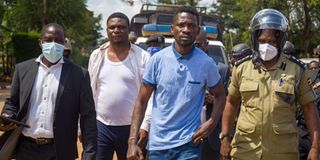Premium
Clash of generations plays out in violent Uganda campaigns

Ugandan musician turned politician Robert Kyagulanyi (2nd R), also known as Bobi Wine, walks to the court in Inganga, on November 19, 2020.
What you need to know:
- President Museveni is campaigning on a theme of securing Uganda’s future.
Mr Kyagulanyi campaign team counters that their candidate is not responsible for the violations because he never calls the supporters who turn up at his events without any prompting.
Ugandans are bracing for the worst as the confrontation between President Yoweri Museveni, who has ruled for 35 years, and opposition candidate Bobi Wine takes a violent turn.
In what is being seen as a clash of generations, Museveni, who has in recent years adopted the posture of grandpa, this week faced a revolt as his Bazukkulu (grandchildren) protested the arrest of Mr Wine, whose real name is Robert Kyagulanyi.
Spontaneous protests broke out over large parts of central, eastern and northern Uganda on Wednesday, following the arrest and detention of Mr Kyagulanyi on charges of engaging in a conduct that is likely to aid the spread of Covid-19.
Dozens of people have so far died as a result of gunshots and injuries sustained in the fracas that followed the confrontations between security agents and protesters. The government says 28 have died but news agencies have quoted higher figures.
Most of the dead were innocent bystanders in the clashes that pitted flame-lighting youths and police who responded with tear gas and live bullets. In some instances, armed people clad in civilian clothing were seen indiscriminately firing AK47s.
In comments a day after the bloody clashes, Mr Museveni stood by his security forces, blaming the violence on agents of “foreign gay groups”. He vowed to make the protesters regret what he described as attacks against supporters of his National Resistance Movement.
Securing Uganda’s future
President Museveni is campaigning on a theme of securing Uganda’s future. Mr Kyagulanyi and a number of young contenders in the crowded 11-candidate presidential ballot are campaigning on a theme of owning and shaping that future.
Mr Kyagulanyi’s arrest in Luuka district where he was scheduled to address a campaign rally on Wednesday, was anticipated. Ever since he got on the campaign trail two weeks ago, he has been received by crowds of enthusiastic supporters who lined the roads and campaign venues to meet him.
The police say his actions are a violation of the standard operating procedures put in place by the Health ministry to prevent the spread of Covid-19. Initially set at 70, the number of people who can be allowed at a public meeting was later relaxed to 200. Mr Kyagulanyi’s rallies have attracted thousands.
Mr Kyagulanyi campaign team counters that their candidate is not responsible for the violations because he never calls the supporters who turn up at his events without any prompting.
President Museveni, who on November 9 launched his campaign at a low-key event in Luwero, the birthplace of the five-year bush war that propelled him to power in 1986, has strictly abided by the SOPs. But his opponents who accuse government agents of blocking their access to broadcast media say the SOPs were designed to favour incumbency.
The security forces have been under pressure to rein in on Mr Kyagulanyi, whose support across the country so far has beaten the earlier narrative that he was an ethnic and urban candidate whose appeal was limited to his native Buganda.
With no visible funding or elaborate party structures, the show of broad support for him has attracted allegations of foreign funding.
Pro-gay groups
President Museveni’s campaign, which had announced a $6.5 million (Sh712 million) budget has been pushing the view that Mr Kyagulanyi is a stooge of pro-gay groups in the United States of America. The allegations do not appear to matter to his supporters who are only concerned about ending President Museveni’s 35-year hegemony.
“Museveni is panicking, yet again trying to subdue the citizens into fear and apathy. But not now. The election is fast-approaching and, despite all these illegalities and violence, we are soon getting our freedom.
Nothing will stop the wind of change sweeping over our nation,” Mr Kyagulanyi said on Friday soon after a court freed him on bail.
Museveni, who rode to re-election in 2011 on the back of the improvised rap hit “Mpe’nkoni”, which loosely translates to “give me the whip,”is unapologetic, seemingly prepared and not sparing the rod. The government’s response to Wednesday’s riots was swift, quickly subduing all pockets of resistance deep into the countryside.
But observers see a gruelling contestation likely to go beyond the January 14 polls.
Salongo Jaffar Amin, son of former president Idi Amin, sees the current standoff as a product of the youth challenging the status quo amid apathy of the middle generations.
“It is a protest against the politics of privilege. You have one per cent of the population who are aged 65 and over, who are responsible for Uganda’s past, calling the shots on over 80 per cent of the population aged 30 and lower, who have known only one ruler,” he said.
“It is like a grandchild asking why his toothless grandpa is the only one eating the liver while the rest look on.”





